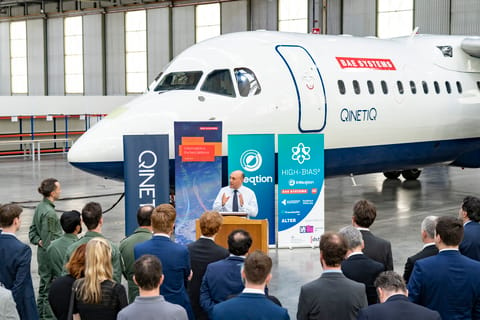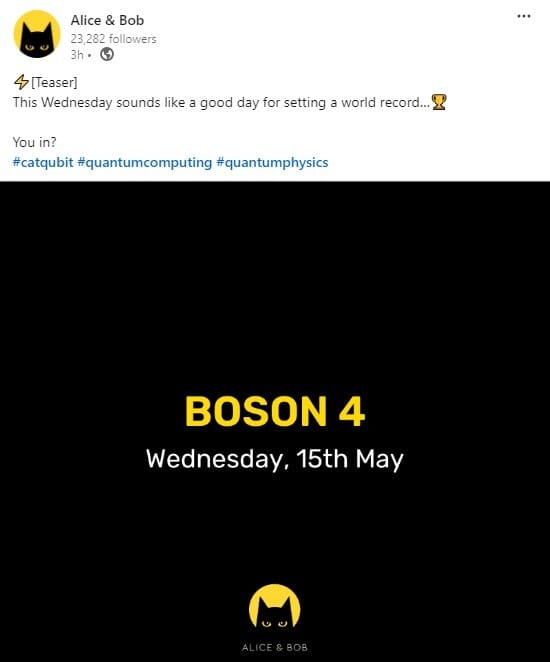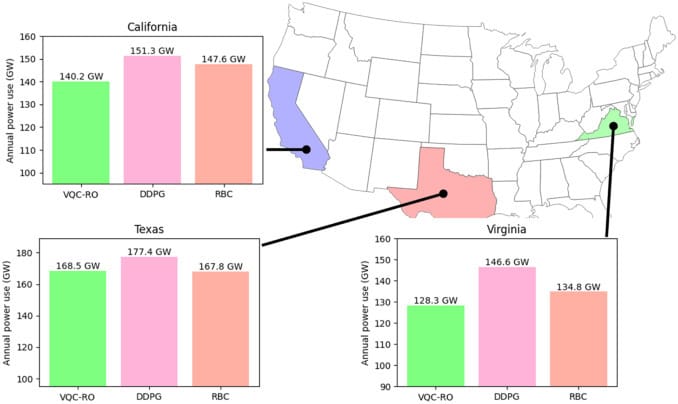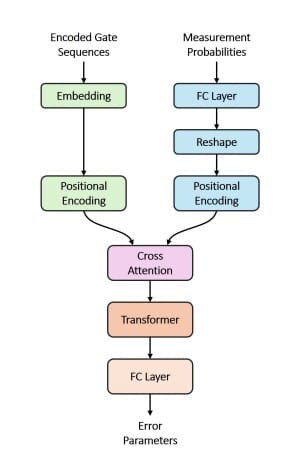- The Daily Qubit
- Posts
- The Daily Qubit
The Daily Qubit
✈️ Infleqtion's Tiqker takes flight. Plus, NVIDIA models global collaboration and France is getting quantum computers & chips in bulk.

Welcome to the Quantum Realm.
Enjoy today’s breakdown of news, research, events & jobs within quantum.
I love to hear from you! Send me a message at [email protected] for musings, for fun, or for insight if it so appeals to you.
IN TODAY’S ISSUE:
Infleqtion’s quantum technologies have successfully been tested in quantum-based aerospace navigation systems in the UK resulting in the most un-spoofable and un-jammable tech available for commerical flights today
A variational quantum computing-based framework that reduces energy consumption and carbon emissions in AI data centers
Machine learning approach to quantum gate set tomography, reduces computational demands through a transformer neural network
Plus, Alice & Bob tease an upcoming world record, IQM to build a quantum computer & chip fabrication unit in France, NVIDIA spreads CUDA-Q to the globe, and D-Wave renews partnership with USC.
😵 Mondays, amirite?
BRIEF BYTES
NEWS FOR THOSE IN A HURRY
Google and OpenAI have AI enthusiasts on the edge of their seats this week so it’s only fair that we get to have our fun, too — have you seen the Alice & Bob teaser post? After the recent news of extended bit-flip error resistance time on cat qubits, it seems like we’re in for an exciting week.
At the Choose France summit, IQM Quantum Computers unveiled plans to construct a first-of-its-kind industrial-grade production site for quantum computers and chips in France. The facility will focus on the production of superconducting quantum processors and the initial phase of the quantum computing project will commence with pilot production at CEA-Leti in Grenoble.
NVIDIA is continuing global quantum computing efforts with its CUDA-Q platform, which is now being adopted by supercomputing centers in Germany, Japan, and Poland. These centers are integrating quantum processing units into their NVIDIA-powered systems to advance research in areas such as AI, energy, and biology. The integration of CUDA-Q into quantum-classical hybrid architectures provides the optimal environment for advancements in scientific discovery and the acceleration of practical quantum computing applications.
D-Wave and the University of Southern California have renewed their multiyear quantum computing partnership which means the USC Viterbi School of Engineering will continue to host a D-Wave Advantage quantum computer. This collaboration provides real-time access to annealing quantum computing through D-Wave's Leap quantum cloud service and aligns with USC's ambitious Frontiers of Computing initiative to advance technologies ethically.
TOP HEADLINES IN NEWS & RESEARCH
NEWS
Tags: AEROSPACE APPLICATION
BRIEF BYTE: The UK is officially at the forefront of aerospace technology innovation after a successful round of testing was completed for advanced quantum-based navigation systems on commercial flights. This quantum technology cannot be jammed or spoofed and is a demonstration of added navigation resilience and accuracy.
WHAT: Infleqtion’s Tiqker optical atomic clock and ultra-cold-atom-based quantum system have successfully completed flight trials as part of an advanced quantum-based positioning, navigation, and timing system. This system was tested aboard QinetiQ's RJ100 Airborne Technology Demonstrator in the UK.
WHY: Backed by nearly £8 million ($100.5 million) in government funding, this project aligns with the UK's National Quantum Strategy. By 2030, its goal is to equip aircraft with quantum navigation systems and set a new standard for navigation technology. Today’s technology is expected to be included in a quantum inertial navigation system to change the way we do PNT — positioning, navigation, and timing.
Learn more about Tiqker below:
RESEARCH
Tags: ENERGY APPLICATION
OVERVIEW OF VARIATIONAL QUANTUM CIRCUIT LEARNING-ENABLED ROBUST OPTIMIZATION FOR AI DATA CENTER ENERGY CONTROL AND DECARBONIZATION
BRIEF BYTE: This study introduces a variational quantum computing-based robust optimization (VQC-RO) framework to manage energy in AI data centers by combining quantum and classical optimization to tackle energy consumption and carbon footprint challenges. The framework successfully reduces energy use by 9.8% and carbon emissions by 12.5% in AI data centers.
WHY: AI data centers have led to increased global electricity consumption and carbon emissions. Due to the growing demand for AI applications, energy management has become critical. The pitfalls of computational complexity and the non-linearity of energy management tasks can be addressed by integrating variational quantum circuits with classical optimization.
HOW: A digital twin of the AI data center was created to accurately simulate and visualize energy usage and optimize operations. The system's operations were modeled as a Markov decision process to capture the dynamics and interactions of different data center components. The variational quantum circuit robust optimization framework combined quantum and classical methods to optimize energy management. The framework's performance was tested through computational experiments across multiple AI data center locations in the U.S. by measuring reductions in power consumption and carbon emissions.
RESULTS: Overall, the VQC-RO framework demonstrated a reduction in energy consumption (up to 12.5%) and carbon emissions (9.8%) compared to traditional methods across locations and conditions. This approach not only increases the sustainability and efficiency of AI data centers but also demonstrates the practical utility of combined classical and quantum methods in creating solutions for real-world problems
Source: Akshay Ajagekar and Fengqi You. Variational Quantum Circuit Learning-Enabled Robust Optimization for AI Data Center Energy Control and Decarbonization. Advances in Applied Energy. (2024). https://doi.org/10.1016/j.adapen.2024.100179
PREPRINT
Tags: MACHINE LEARNING
OVERVIEW OF TRANSFORMER MODELS FOR QUANTUM GATE SET TOMOGRAPHY
BRIEF BYTE: This study proposes Ml4Qgst, a new approach to quantum gate set tomography that integrates machine learning with a transformer neural network to reduce computational complexity.
WHY: Quantum gate set tomography is used to characterize the operational capabilities and limitations of quantum processors. Traditional quantum tomography methods are computationally expensive due to the complex, nonlinear nature of quantum systems. Machine learning, particularly deep learning models like the transformer, can manage the computational complexity of QGST by handling the nonlinear, multi-model regression tasks involved.
HOW: The ML4Qgst model uses a transformer neural network to address the challenges of QGST and verify that the resulting quantum processes are completely positive and trace-preserving (CPTP). Techniques such as data grouping and curriculum learning are used to improve the model’s performance and efficiency in learning complex QGST tasks.
RESULTS: The ML4Qgst model performed QGST with high accuracy, matching while sometimes surpassing more traditional methods such as pyGSTi. The model effectively estimated error parameters and produced corresponding process matrices.
Source: King Yiu Yu and Aritra Sarkar and Ryoichi Ishihara and Sebastian Feld. Transformer Models for Quantum Gate Set Tomography. arXiv quant-ph. (2024). https://doi.org/10.48550/arXiv.2405.02097
EVENTS
Monday, May 13 | D-Wave conference call on Q1 2024 financial results
Thursday, May 16 | Report on Quantum Computing in the Global South by the Centre for Quantum and Society
Monday, May 20 | Stanford Responsible Quantum Technology Conference
Now - May 31 | Register for Google/X-Prize Quantum Challenge
JOBS POSTED WITHIN LAST 24 HOURS
CIA Quantum Computing Scientist | Washington, DC $61.9K - $164.1K
UNTIL TOMORROW.
SUPPORT SCIENCE
Waking up before the world to dive into the quantum realm isn't just our job—it's our calling. And we're dreaming big with exclusive content for our community. If our work lights up your day, consider showing some love. Your support unlocks worlds—seen and unseen.
How many qubits was today's newsletter? |
Interested in collaboration or promoting your company, product, job, or event to the quantum computing community? Reach out to us at [email protected]



